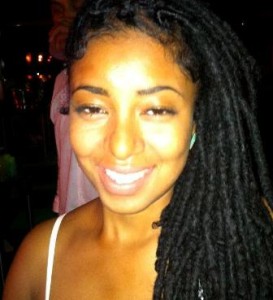| Safiyah West, Health Educator | An Exploration of the Position of Minority Lesbian Women at the Intersection of Empowerment and Social-Services Standing at the front-line of the seemingly impenetrable wall of society’s deep-rooted racist, sexist, and homophobic infrastructure, lesbian women of color have suffered in the empty silence of both externally-imposed as well as self-imposed dungeons; dungeons which have more recently been likened to closets. The concept of “coming out of the closet” has been romanticized by pop-culture and the entertainment industry by the increasing trend of wealthy white celebrities leaking personal accounts of scandalous and “elicit” sexual experiences to the public about undisclosed lesbian lovers. Furthermore, we are bombarded by sex-symbols, subliminal messaging, and sexually provocative images of white women exchanging tender caresses in the midst of luxurious back-drops, illustrating none-else than the harmfully preferential path by which society has been weaned into accepting homosexuality. The glitz, glamour and avant-garde spirit of homosexuality as portrayed by these same almost fantastical figures have captivated the public in precisely the way major marketing agencies have intended. When all glitz and glam, wealth, power, influence and coercion is set aside however, it is clear that being a lesbian woman, specifically a lesbian woman of color, quickly loses its grandeur. So why is it that over a century since slavery has ended, in an era post Jim-Crow segregation laws restricting people of color from basic services, are lesbians of color still being relegated to dungeons? Could it be that the laws of these atrocious times have left a permanent imprint on the psyche of minorities? More pertinently, has it left subsets of these minority populations especially susceptible to complacency around the access and attainment of social services which directly pertain to them? Perhaps lesbian women of color are collectively suffering from a form of post traumatic stress disorder which has encumbered them from taking a stand in the name of gay-pride to seek out and demand equal rights. Already burdened by the load of being a black woman in America, arguably the most disenfranchised and at-risk demographic, it is not hard to imagine why lesbian women of color have not historically been at the forefront of the movement towards gay-rights, and partaking in the LGBT services that are offered to their “sub-culture” in the same numbers as their white counter-parts. On the contrary, the members of this same “sub-culture” who are most proactively involved in these movements and making use of services (however scarce) that are offered to the LGBT community, tend to be middle to upper class white gay men and white lesbian women. On a rudimentary level, these aforementioned demographics within the LGBT sphere depict a hierarchy that mirrors that of the greater society; race and class being both intertwined and telling of the system of privilege which exists. For this reason, the concept of gay-pride amongst the white LGBT population is a phenomenon secure in its foundation of white-privilege; whereas gay-pride in the black LGBT community is often chocked amidst stigma, poverty, and the everlasting imprint of racial injustice. A person’s ability to even self-identify as a lesbian—that is to come out to one’s friends and family and to openly express one’s sexual-identity in public spaces, is a luxury. In many minority communities, homosexuality is met with harsh homophobic attitudes, violence, and stigma. As a consequence, many Black and Hispanic lesbian women are confined to closets so dark, so deep, and so full of baggage that they are better referred to as dungeons. Minority lesbian women are discouraged from seeking-out and asking for services that are more tailored to their needs because they are not empowered enough in their positions first as women, secondly as minorities, and finally as lesbians. They will often settle for externally imposed barriers and adopt them as the norm. For example, many minority lesbian women will not seek-out Primary-Care Doctor’s that are sensitive and concerned about their sexual-identity and specific needs, they will not be active in support groups and educational sessions for lesbian women in their communities (lest they be unwillingly discovered by others before officially coming out), and they will generally seclude and isolate themselves, thus lacking the cohesion, visibility, and sense of community more easily found amongst gay men. In the Just For Us program’s pre-implementation and planning period, one focus group participant shared, “I have yet to ever be asked my sexual orientation, and I’m 61 years old.” This in and of itself exemplifies the societies lack-luster attitude towards acknowledging the special and targeted needs of the LGBT population. As providers in the social-service field, especially when serving the LGBT population, it is critically important to be aware of all of these factors, and to address them accordingly. At Iris House, the Just For Us Program is the only program of its kind to be funded under the first WSW grant in the nation. More specifically, the Just For Us Program offers educational sessions to African-American and Latina lesbian/bisexual adolescents and women ages 13+ who are HIV-positive or at high-risk in order to prevent new HIV infections, sexually transmitted infections (STI), and hepatitis C. The Just For Us Program of Iris House strives to be aware of these trends and barriers in both reaching this vulnerable demographic, and in gaining the trust and presence of minority lesbian women in support groups and other such settings in order to address the service gaps for this population of women. To do so, it requires that we as providers be culturally aware and informed about the layers of barriers that exist for these women. These barriers can often be sourced way ahead of and extend far beyond sexual-identity. Looking at the socio-economic status, cultural attitudes and norms, and levels of need for social services that cater to minority lesbian women within specific communities requires in-depth research, community involvement, out-reach, time and familiarity in order to establish the foundation of trust that will ultimately bring these women out of the dungeons. Gaining the participation of these women, and getting them access to the services and the support they need as minority lesbian women initiates an invaluable first step towards empowering them to change their attitudes about their own situations, and to educate their communities likewise. It empowers them to seek-out and demand gay-friendly/gay-sensitive services and to act as advocates to future-generations who may also find themselves waywardly astray at the intersection of empowerment and social-services. Safiyah West, Health Educator |


 RSS Feed
RSS Feed
